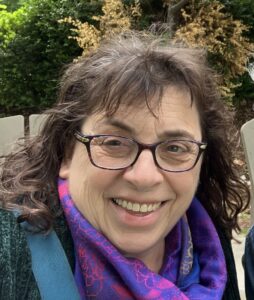 Caryn Mirriam-Goldberg is the 2009-2013 Poet Laureate of Kansas, a long-time transformative language artist, and the author or editor of 24 books, including poetry, memoir, fiction, non-fiction, and anthologies. As a poet, fiction and non-fiction writer, teacher, mentor, and facilitator, she explores and celebrates how the spoken, written and sung word can help us live more meaningful and vibrant lives. The founder of Transformative Language Arts, she values social and personal transformation through the spoken, written and sung word. Learn more about her course Long Night’s Journey into Day: Writing Poetry Through and About Serious Illness.
Caryn Mirriam-Goldberg is the 2009-2013 Poet Laureate of Kansas, a long-time transformative language artist, and the author or editor of 24 books, including poetry, memoir, fiction, non-fiction, and anthologies. As a poet, fiction and non-fiction writer, teacher, mentor, and facilitator, she explores and celebrates how the spoken, written and sung word can help us live more meaningful and vibrant lives. The founder of Transformative Language Arts, she values social and personal transformation through the spoken, written and sung word. Learn more about her course Long Night’s Journey into Day: Writing Poetry Through and About Serious Illness.
After years of facilitating writing workshops often focused on healing and creativity and working closely with students at the college level and in the community, I got breast cancer. At the end of my last chemo appointment after a grueling six months and right between a whole lot of surgeries, my oncologist said, “Anything else you want to ask me?”
“Yes, can I do a writing workshop at this hospital with people living with cancer and other serious illness?”
He said yes, arranged for me to meet with the education department, and in little time, I was not only facilitating workshops at my local hospital but leading workshops at Turning Point, a center for hope and healing now part of the University of Kansas Medical Center.
That was 2003, and I’ve been deep in this work ever since. Like many of us as we age and change, I’ve also been immersed in life experience related to serious illness, like supporting my mother-in-law, who was started hospice because of late-stage heart disease, was kicked off after three years, and then died.
I sat opposite my friend Charles, clutching both of my hands with both of his right after his oncologist told him he had less than two months left, when he asked me to help him die well. Then he broke into singing “Maizy Doats.”
I also have been through my own second cancer surprise when in 2019 I was diagnosed with a rare and particularly dangerous cancer, ocular melanoma (eye cancer). I made it through painful treatments while leading writing workshops with people who continually taught me the workaday wonders and ordinarinesses of resilience through their stories of living with chronic illness
Like many of us, I’ve watched and talked with so many friends and family living with unpredictable and sometimes debilitating illnesses. Some puzzle through whether to feel extensive pain or take meds that wipe them out. Others try to plan their work with enough flexibility to accommodate flair-ups of autoimmune diseases.
Life is like this, and if we haven’t had a serious health challenge yet ourselves, we likely love someone who has. While there’s no one-size-fits-all playbook for navigating our best way through, there is this: the power of being well-witnessed.
This is where writing workshops – like my upcoming “Long Night’s Journey Into Day: Writing Poetry Through and About Serious Illness” – come in. When we can create together – even if we’re hurting, struggling with the sadness and anxiety, exhausted or afraid – we can feel a little more alive and a lot more accomplished by writing with others. Maybe we didn’t have enough spoons* to do the dishes, meet a friend for coffee, or work in the garden, but we could write a poem or listen to someone share their new seedling of writing. Having others witness what we write helps us feel the weight of our words and the joy of our creativity.
We can also say and even joke about things we can’t always share elsewhere. In such communities, we are free from the heaviness of putting on a brave face and can simply declare “I’m having a crappy day,” “Don’t ask,” and “I’m hurting but I’m here” – without fear of judgment. We can also tell each other happy moments – good test results, good breakthroughs, and good encounters with people who “get it” about what a depth of relief we’re experiencing.
Good witnessing teaches us to listen to ourselves and to see a wider perspective, including just about all of us are carrying or living with something seemingly impossible. Together, we knock the veil off what our lives look like to get down to what matters.
In writing together, we arrive at the doorsteps of the story we’re actually living rather that remaining stuck between what we’re living and the story we thought we were living. In this way, we can come home to ourselves with a little more compassion, understanding, wisdom, and gratitude for what gives our lives and writing meaning. Whatever we write in the workshop travels with us – as does the experience of being in a brave and loving space where, above all, we know we’re not alone.
*Spoon theory, a term coined by Christine Miserandino, refers to the mental and physical energy a person living with chronic illness has for daily and beyond-daily tasks. It’s a useful term of naming where to draw limits. See Miserandino’s explanation and more here: https://lymphoma-action.org.uk/sites/default/files/media/documents/2020-05/Spoon%20theory%20by%20Christine%20Miserandino.pdf



As a writer and writing teacher living with cancer–now a second incurable reiccurrence–I want to strongly applaud the work you’re doing. Writing alone and in/with a group about illness–finding “the words to say it, ” as Marie Von Franz described in her classic book of that name–is soul-healing, whatever is possible or not for the body. Wonderful you’ve been offering such spaces for so long, even as you’ve met your own cancer’s and treatment woes.
Such beauty from struggles Denise
I’m a retired poet, lifelong essay writer, survivor of lymphoma when I was 36, and have dealt with multiple late effects from my treatment (thyroid disease, heart disease) for many years. Most recently I’ve been diagnosed with Alzheimer’s disease (there is a significant family history). My guess is that I have been ill for at least a couple of years.
As I face what are sure to be the final years of my life, I have found that continuing to write prose (mostly in the form of journaling and short essays) and integrating drawing and painting with this helps me cope with what’s to come.
I discovered a couple of years ago after starting an online poetry writing group that my ability to continue with poetry was fading. I didn’t understand at the time, but looking back, I now recognize that this was the first manifestation of my dementia. Letting go of this part of my life has grieved me, but at least I finally came to understand why.
I would love to be a part of this group. Writing will eventually be impossible for me, but it has defined most of my life, and I will continue with it for as long as I possibly can.
Warm regards to you all.